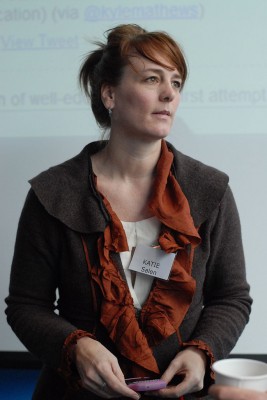How do advocates of digital learning know that students learn better via computers than more traditional methods? Katie Salen is tired of hearing people say, ‘Prove to us that technology works before we buy it.’ She says waiting for irrefutable proof is the wrong approach.
Salen—a professor in DePaul University’s School of Computing and Digital Media—developed an educational model that uses video games in the classroom. It’s used by Quest to Learn, a two-year-old public school in New York City, and ChicagoQuest, a charter school that opened this fall in the Windy City. Salen is a co-founder of Quest to Learn.
She’s also a game designer.
Salen says game designers don’t aim to make perfect, proven products before they put them out on the market. That, she says, is how textbook publishers work.
Instead, she says, video-game companies develop products with users. They might issue an early version with kinks or bad ideas. And then it’s a dynamic process where user feedback helps the designer improve a game. There’s constant fixing. The video game is ever evolving.
She’d like to see schools experiment with education software in the same way, rather than waiting for definitive proof that certain products work. The more students play with educational games, the more game designers can make them effective.
Related Stories
How a “tech break” can help students refocus
Q&A with Lisa Gillis: Rethinking how we educate ‘digital natives’
Q&A with former Gov. Bob Wise: What will a ‘digital’ school look like in 5 years?
In the meantime, the evidence is mostly anecdotal, from the “everyday transformations” that Salen sees happening in classrooms to student victories over competitors from other schools—such as the video-game-trained students from Quest to Learn who recently won a math competition.




